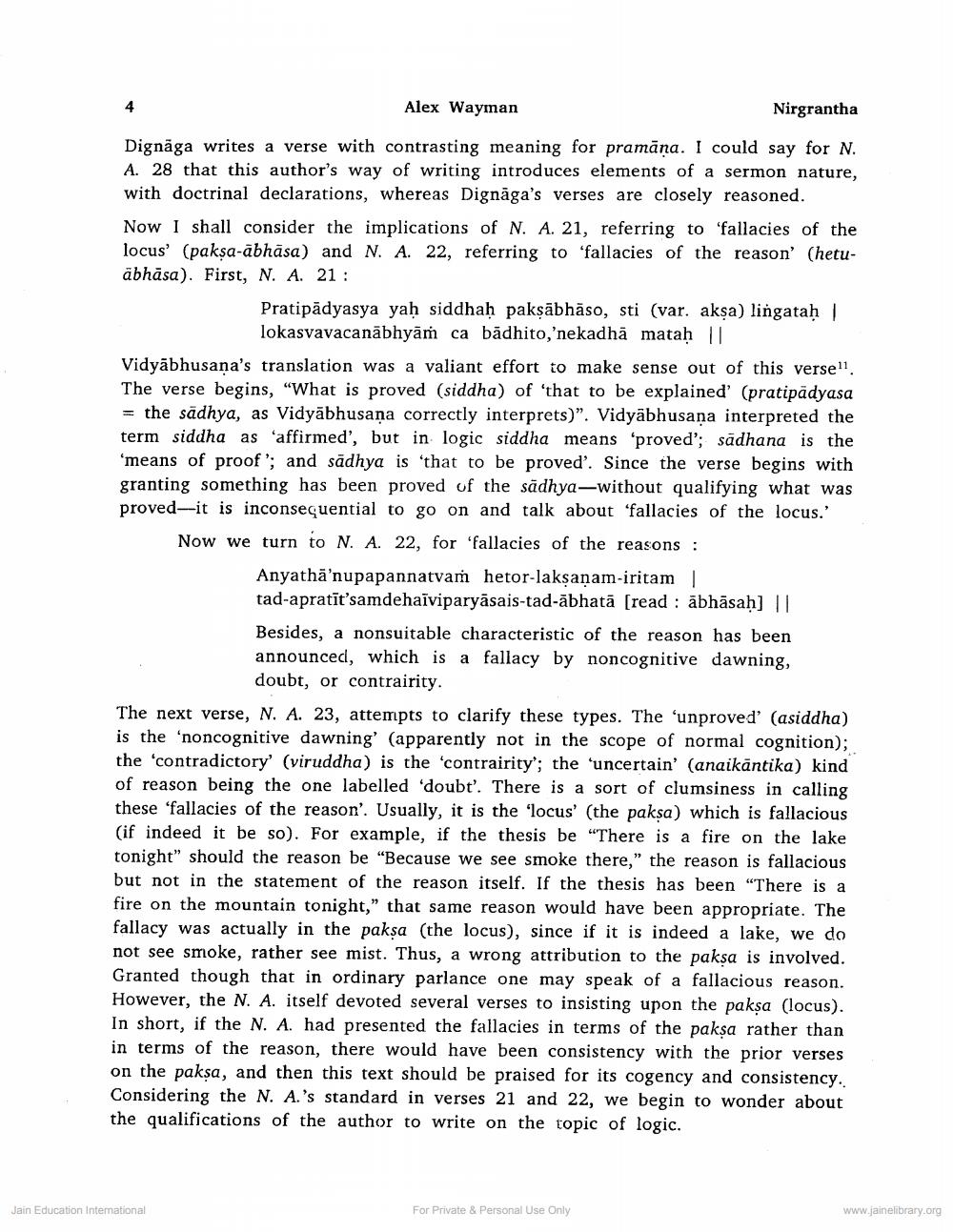________________
Alex Wayman
Nirgrantha Dignaga writes a verse with contrasting meaning for pramäna. I could say for N. A. 28 that this author's way of writing introduces elements of a sermon nature, with doctrinal declarations, whereas Dignaga's verses are closely reasoned.
Now I shall consider the implications of N. A. 21, referring to fallacies of the locus' (pakṣa-ābhāsa) and N. A. 22, referring to 'fallacies of the reason' (hetuabhasa). First, N. A. 21:
Pratipadyasya yaḥ siddhaḥ pakṣābhāso, sti (var. akşa) lingataḥ | lokasvavacanābhyam ca badhito,'nekadha mataḥ
Vidyabhusana's translation was a valiant effort to make sense out of this verse11. The verse begins, "What is proved (siddha) of 'that to be explained' (pratipadyasa
the sädhya, as Vidyabhusana correctly interprets)". Vidyabhusana interpreted the term siddha as 'affirmed', but in logic siddha means 'proved'; sadhana is the 'means of proof'; and sädhya is that to be proved'. Since the verse begins with. granting something has been proved of the sadhya-without qualifying what was proved-it is inconsequential to go on and talk about 'fallacies of the locus.' Now we turn to N. A. 22, for 'fallacies of the reasons:
Anyatha'nupapannatvaṁ hetor-lakṣaṇam-iritam | tad-apratīt'samdehalviparyäsais-tad-abhatā [read: abhäsaḥ] ||
Besides, a nonsuitable characteristic of the reason has been announced, which is a fallacy by noncognitive dawning, doubt, or contrairity.
The next verse, N. A. 23, attempts to clarify these types. The 'unproved' (asiddha) is the 'noncognitive dawning' (apparently not in the scope of normal cognition); the 'contradictory' (viruddha) is the 'contrairity'; the 'uncertain' (anaikantika) kind of reason being the one labelled 'doubt'. There is a sort of clumsiness in calling these 'fallacies of the reason'. Usually, it is the 'locus' (the paksa) which is fallacious (if indeed it be so). For example, if the thesis be "There is a fire on the lake tonight" should the reason be "Because we see smoke there," the reason is fallacious but not in the statement of the reason itself. If the thesis has been "There is a fire on the mountain tonight," that same reason would have been appropriate. The fallacy was actually in the paksa (the locus), since if it is indeed a lake, we do not see smoke, rather see mist. Thus, a wrong attribution to the pakṣa is involved. Granted though that in ordinary parlance one may speak of a fallacious reason. However, the N. A. itself devoted several verses to insisting upon the paksa (locus). In short, if the N. A. had presented the fallacies in terms of the paksa rather than in terms of the reason, there would have been consistency with the prior verses on the paksa, and then this text should be praised for its cogency and consistency. Considering the N. A.'s standard in verses 21 and 22, we begin to wonder about the qualifications of the author to write on the topic of logic.
Jain Education International
For Private & Personal Use Only
www.jainelibrary.org




